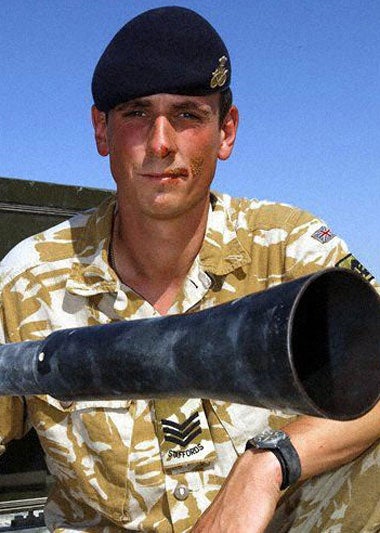'I had to get out' - soldiers tell of escape as Warrior caught fire

The Warrior was part of a rescue mission on Monday when two undercover SAS officers were arrested after allegedly shooting an Iraqi policeman when challenged at a checkpoint. Demonstrators attacked four British armoured vehicles with stones and Molotov cocktails. The two British soldiers were eventually freed from custody, after a raid that destroyed part of Basra's main police station.
One soldier, named as Pte Ryon Burton, who was seen escaping from the stricken Warrior engulfed in flames, described the escalation in the hostility to Sky News. He said: "The crowd grew more hostile, throwing petrol bombs. I heard the gunner shouting that a petrol bomb had gone into the turret, we were on fire from the back.
"We tried to lift the opening device... I had to get out... I jumped through the fire to get out, and couldn't breathe at all; I was just thinking about my life."
Pte Burton, who suffered only minor injuries, said as soon as he got out of the tank, five or six people offered assistance.
L/Cpl Jo McCann, who was also trapped in the Warrior, said that he heard the vehicle's gunner say the sights had been smashed. Almost immediately, a petrol bomb fell through the turret into the Warrior. L/Cpl McCann said he dived over the back of the vehicle, and was dragged away to medics.
Although the Warrior was ablaze, at least one of the soldiers returned to the vehicle. "It looked a lot worse than it was," L/Cpl McCann said. "The Warrior is quite a tough vehicle. It was a bit hot to touch, but not too bad. The instruments still worked OK."
Sgt George Long said that the soldiers had been under "heavy bombardment" inside their tank. "The crowd grew more hostile, carrying petrol bombs; one unfortunately hit the top. I had to get out; [the Warrior] was in flames."
The soldiers did not describe how they escaped the armed crowds after being attacked. There was also no reference in the interviews to a number of Iraqi civilians who were reportedly killed as the mob surrounded the Warriors.
The soldiers' accounts were broadcast as evidence emerged that militia fighters were being "encouraged" to infiltrate the Iraqi army and police, whose arrest and detention of the undercover British soldiers led to Monday's confrontations.
The Ministry of Defence confirmed that there was a desire to "integrate" militias into the regular forces. But British officers who have taken part in the training programme say the real aim of recruitment was to show that the Iraqi forces had vastly increased in numbers and to pave the way for withdrawal by coalition troops.
The Ministry of Defence announced an investigation by the Royal Military Police into the arrest of the SAS members by Iraqi police, and the subsequent controversial rescue mission. Officers from the Special Investigation Branch will interview the two SAS men and, if possible, members of the Iraqi police force. " It will be a lessons-learnt exercise, mainly to work out why it went so badly wrong", a senior defence official said.
Speaking in London, Mr al-Jaafari denied that the incident had strained relations between the two countries. The Iraqi Prime Minister said he did not have full details of what had happened, but added: "At this time, when there are forces in Basra and all over Iraq, such things are expected to happen.
"We are investigating the matter and we hope to know the truth on the ground. [But] it will not affect the relationship between Iraq and Britain."
Accusations and recriminations over the affair continue. Iraqi authorities now say that five civilians were killed in the operation that led to the freeing of the two SAS men. The British Army says the operation was necessary as the soldiers had been handed over to a Shia militia.
More than 200 Iraqi policemen yesterday took part in an angry anti-British demonstration in Basra calling for the city's police chief to be fired and "British terrorists" to be tried in an Iraqi court.
In Baghdad, the Interior Minister, Bagir Solagh Jabr, flatly contradicted the British claim that the two soldiers had been handed over to the militia. " The British had acted on rumours when they attacked the police station," he said.
Colonel Bill Dunham of the British Army, chief of staff for multinational forces in Basra, said that infiltration of the Iraqi army and police by the militias remained a major problem. "We are aware of rogue elements in the Iraqi police service," he said. "The trick that we have to pull off now with the Iraqi authorities is to identify those elements, to weed them out."
But British officers who served in southern Iraq say the price is now being paid for letting members of the Mehdi Army, led by the radical Shia cleric Muqtada Sadr, and the Badr Brigade, which has Iranian support, join the security forces. "There was little or no vetting", one officer said. "The idea was just because these were Shias and anti-Baath, they will be all right."
Subscribe to Independent Premium to bookmark this article
Want to bookmark your favourite articles and stories to read or reference later? Start your Independent Premium subscription today.

Join our commenting forum
Join thought-provoking conversations, follow other Independent readers and see their replies